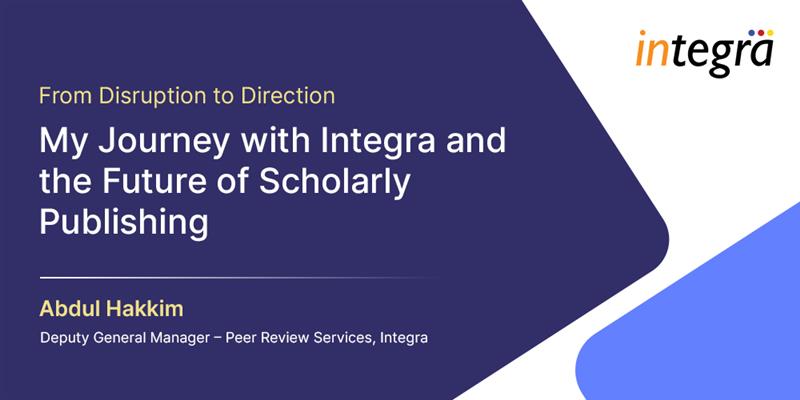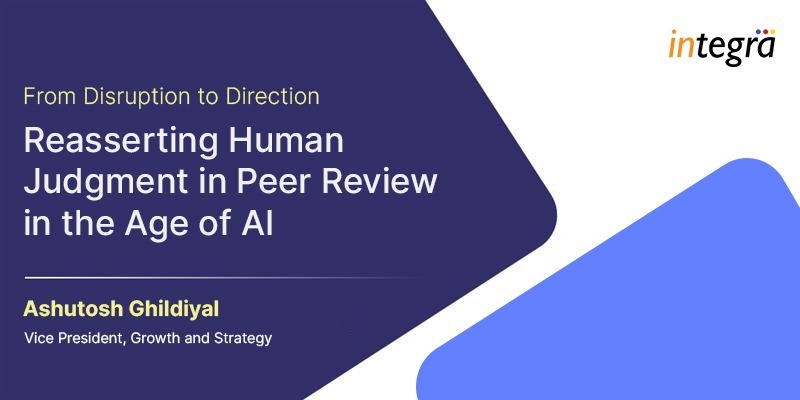From Disruption to Direction: My Journey with Integra and the Future of Scholarly Publishing

When I reflect on my decade-long journey in scholarly publishing, from an editorial assistant in 2015 to leading a team of 160+ professionals in peer review services and research integrity, I don’t just see career progression. The transformation from technical checks to human judgement, expertise on conventional submission system to adopting modern system and evolving trends on scholarly knowledge are key to prepare for next generations. Today, I feel more aligned with that purpose at Integra .
This isn’t just my story, it’s the story of an entire industry struggling with unprecedented challenges: surged manuscript volumes, complex research misconduct, AI-driven but human created challenges, and the constant pressure to maintain scientific quality while accelerating discovery. It’s about how we’ve evolved from gatekeepers to partners in the scholarly communication ecosystem.
1. From Assistant to Architect: Understanding the Seismic Shift
The scholarly publishing landscape has undergone a fundamental transformation since I began my career. A straightforward editorial support role has evolved into something far more impactful.
The Old Paradigm: Peer review administration was largely a manual, sequential process. Editorial assistants handled administrative tasks while senior editors made all strategic decisions. Research integrity was often addressed reactively, after problems had already emerged. Success was measured by simple metrics: turnaround times and acceptance rates.
The New Reality: We now orchestrate sophisticated, multi-layered systems that combine human expertise with advanced technology. Success is measured by the quality of scientific discourse we enable, the integrity we protect, and the innovation we facilitate. We’re not just processing manuscripts, we’re safeguarding the future of scientific discovery.
This transformation encompasses several critical dimensions:
Volume and Velocity: Manuscript submissions have grown exponentially, driven by increased global research output, publish or perish culture, and open science initiatives. We’ve had to fundamentally rethink how we scale operations without compromising quality.
Sophistication of Threats: From simple plagiarism to elaborate paper mills, AI-generated content, and manipulated images, the challenges to research integrity have evolved dramatically. Our detection methods must constantly stay ahead of increasingly sophisticated bad actors.
Technology Integration: From basic manuscript tracking systems to AI-powered forensics tools, machine learning algorithms for reviewer matching, and automated screening protocols, technology has become central to everything we do.
Stakeholder Expectations: Publishers, editors, authors, and readers all expect higher standards of transparency, faster decision-making, and more robust quality assurance. The bar continues to rise.
That’s what drew me to Integra: the opportunity to build something meaningful at the intersection of human expertise and technological innovation, where we could truly make a difference in the scholarly communication ecosystem.
2. Building Editorial Excellence at Scale: The Integra Approach
Building and leading a team of 160+ professionals in peer review services and research integrity isn’t just about management, it’s about creating an environment where expertise thrives and innovation flourishes. At Integra, we’ve developed a comprehensive approach that serves publishers across disciplines while maintaining the highest standards of quality and integrity.
Our Comprehensive Service Portfolio:
- Manuscript triage with SME expertise
- Reviewer identification, invitation, and management
- Quality assessment and decision support
- Technical and administrative coordination
Research Integrity Support
- Image forensics and manipulation detection
- Paper mill identification and prevention
- Reviewer identity verification
- Plagiarism screening
- Ethical screening and conflict of interest management
- AI tools combined with human expert judgement
Editorial Office Support
- Submission processing and email support
- Peer review administration and workflow optimization
- Staff training and capability building
- Technology integration and reporting
- Strategic planning and continuous improvement
The Partnership Philosophy
What sets Integra apart is our commitment to true partnership. Through our peer review services, we don’t just handle tasks, we integrate seamlessly with editorial operations teams, becoming an extension of the journal’s team while bringing specialized expertise and scalable capacity.
This means:
- Shared Accountability: We share and take ownership for outcomes, not just deliverables
- Strategic Alignment: Our success metrics align with editorial and publisher objectives
- Adaptive Excellence: We evolve with changing requirements and emerging challenges
- Transparent Communication: Visibility into processes, decisions, and performance
Whether it’s supporting a high-impact journal with complex research integrity challenges, managing peer review for rapid publication timelines, or implementing new quality assurance protocols, we bring clarity to complexity and enable journals to maintain excellence while scaling effectively.
3. Research Integrity: From Compliance to Competitive Advantage
The research integrity landscape is undergoing a dramatic transformation. What was once primarily about detecting obvious plagiarism has evolved into a sophisticated battle against increasingly creative forms of research misconduct. At Integra, we have positioned research integrity not as a compliance burden, but as a strategic differentiator that protects journal reputation and advances scientific progress.
The Evolving Threat Landscape
Traditional Challenges:
- Plagiarism
- Duplicate submission
- Citation manipulation
- Data fabrication and falsification
- Authorship disputes and ghost writing
Emerging Sophisticated Threats:
- Paper mills with elaborate review networks
- AI-generated content and manipulated research
- Systematic image manipulation
- Coordinated reviewer fraud and identity theft
Integra’s Proactive Defence Strategy
Our comprehensive research integrity approach includes:
- Technology focused: Using cutting-edge software for image forensics, AI-powered content analysis, and identifying suspicious reviewer patterns, etc.
- Human Expertise Integration: Subject matter experts who understand disciplinary contexts and experienced investigators who can follow complex trails of evidence.
- Strengthened policies and procedures: Robust initial screening protocols that catch issues early, reviewer verification, policy recommendations based on emerging threat and continuous learning on latest integrity challenges
- Collaborative Intelligence: Industry collaboration on best practices and emerging issues and Proactive communication about integrity risks and solutions.
4. AI and Automation: The Human-Machine Partnership Revolution
Artificial Intelligence is reshaping peer review and research integrity in unexpected ways. Rather than replacing human expertise, AI is amplifying it, creating new possibilities for detection, efficiency, and scale that were unimaginable when I started my career.
The AI Advantage in Scholarly Publishing
Manuscript Processing Intelligence
- Automated technical compliance checking across 40+ parameters
- Real-time plagiarism detection with sophisticated similarity analysis
Research Integrity Acceleration
- Advanced image forensics that detect pixel-level manipulation
- Pattern recognition for identifying paper mill indicators
- Behavioral analysis of reviewer and author networks
- Automated screening for fabricated or suspicious data patterns
Reviewer Matching Optimization
- AI-powered expertise analysis based on expertise
- Bias detection to ensure diverse reviewer pools
The Critical Human Element
While AI provides unprecedented capabilities, human expertise remains irreplaceable. In our team of 160+ professionals, every AI-driven process is enhanced by human judgment. AI can flag potential issues, but human experts understand the nuances of disciplinary standards, methodological appropriateness, and scientific significance.
- Subject Matter Expertise:
- Ethical Reasoning
- Communication Excellence
- Strategic Vision
This human-AI synergy allows us to achieve the best of both worlds: the efficiency and consistency of automation with the wisdom and judgment that only experienced professionals can provide.
5. A Call to Action: Shaping The Future
The scholarly publishing industry stands at a critical stage. The decisions made today will determine not just who succeeds in tomorrow’s market, but how effectively we serve scientific community. The challenges are significant, but so are the opportunities for those willing to embrace change.
The Strategic Imperative
Invest in Sophisticated Integrity Systems
The cost of implementing robust research integrity measures is far less than the cost of a major integrity crisis. Choose partners who can provide comprehensive, proactive protection rather than reactive damage control.
Embrace AI While Preserving Human Judgment
Leverage artificial intelligence to scale your operations and enhance detection capabilities, but never lose sight of the human expertise that provides context, wisdom, and ethical reasoning.
Build Scalable Excellence
Design systems that can grow with increasing submission volumes while maintaining or improving quality standards. This requires thoughtful integration of people, process and technology.
Collaborate for Industry Progress
The challenges we face, from paper mills to AI-generated content, require industry-wide cooperation. Share intelligence, adopt best practices, and work together to stay ahead of emerging threats.
This is the future we’re building together.
Final Thoughts: The Journey Continues
Ten years ago, I entered this industry as an editorial assistant with curiosity about how editorial teams support scientific publicationand gets shared. Today, I lead a team of 160+ professionals with a deep understanding of our critical role in the publishing ecosystem. The challenges are more complex, but our impact is more significant than I have imagined.
At Integra, we found our purpose in protecting and enhancing the peer review process, ensuring that every effort of authors, reviewers and editors are valued at each touchpoint.
Whether it’s implementing our comprehensive screening checklist, managing reviewer workloads to prevent burnout, detecting sophisticated AI-generated content, building diverse global reviewer networks, or solving the widespread delays that frustrate authors worldwide, our approach combines systematic processes with deep human expertise. We understand that behind every manuscript is a researcher seeking to contribute to human knowledge, and behind every review is a busy professional balancing multiple commitments while serving the scientific community.
The journey from disruption to direction isn’t complete, it’s evolving every day as new challenges emerge and new solutions become possible. But I’m confident in our approach: combining deep human expertise with cutting-edge technology, building trustworthy partnerships with our clients, and never losing sight of why this work matters.
We are proud to be part of shaping what comes next in scholarly publishing.
Thank you for reading. The conversation about the future of peer review and research integrity continues, connect with me on LinkedIn or reach out directly to discuss how we can work together to advance scientific excellence.
About the Author: Abdul Hakkim Sabibulla is Deputy General Manager of Peer Review Services at Integra, where he leads a team of 160+ professionals providing comprehensive peer review and research integrity services. With a decade of experience spanning editorial administration to strategic management, he is passionate about leveraging technology and human expertise to protect scientific integrity while enabling efficient scholarly communication. Hakkim specializes in building scalable operations, empowering teams , enhancing continuous learning , and fostering innovation in peer review processes.
Recent Blogs

Print, Pedagogy, and AI: The New Architecture of Educational Publishing

From Disruption to Direction: Reasserting Human Judgment in Peer Review in the Age of AI


